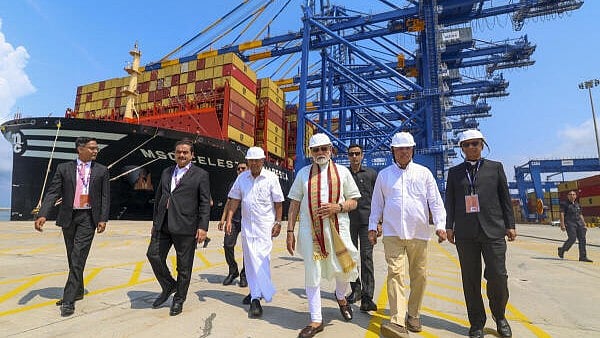
In this image released by PMO on May 2, 2025, Prime Minister Narendra Modi, Kerala Governor Rajendra Arlekar, Chief Minister Pinarayi Vijayan, Adani Group Chairman Gautam Adani and others at the newly-inaugurated Vizhinjam International Seaport, in Thiruvananthapuram.
Credit: PMO via PTI Photo
India’s money will now serve India, Prime Minister Narendra Modi said, after dedicating the Vizhinjam International Deepwater Multipurpose Seaport to the nation on May 2.
Nearly 75 per cent of India’s transhipment operations are conducted at foreign ports, like the ones in Singapore, Colombo and Dubai, causing significant revenue loss for the country. The Rs 8800 crore new port in Thiruvananthapuram now promises to bring the business home. The money that once flowed outside will now generate new economic opportunities for Kerala and the rest of India, said Modi.
The Vizhinjam port on the southern coast of Kerala is just around 10 nautical miles (19 km) from the east-west shipping channel, a key international shipping route. The new port is billed as India’s first dedicated transhipment facility. Large ship containers can now directly dock at the Vizhinjam port, instead of berthing at ports like Singapore and Colombo and transferring goods to smaller vessels for onward transport to India.
It will significantly cut down India’s annual expenditure of around $220 million on using foreign ports for transhipment purposes. Transit time will also be reduced significantly.
Apart from the money and time, an important critical factor in international trade is geopolitical risks, which would also be significantly addressed by the new port.
Engineering Export Promotion Council of India (EEPC India) Chairman Pankaj Chadha said that the new facility would be of great help to exporters and importers and would pave the way to make India a transhipment hub.
“Currently, the transhipment hub is Colombo. The Vizhinjam port will help in getting the transhipment shifted from Colombo to Vizhinjam,” said Chadha.
Ports have been one of the key focus areas of infrastructure development in the past decade. India’s port capacity has doubled in the past 10 years.
Vizhinjam port has been developed at an estimated cost of Rs 8,867 crore under a public-private partnership with Adani Ports and SEZ Ltd. Its natural deep draft of nearly 20 meters and location near one of the world's busiest sea trade routes will help strengthen India’s position in global trade.
The bulk of India’s cargo is handled through 12 major ports located on both the eastern and western coasts of the country. The central government has invested significantly in upgrading existing ports and developing the new ones under ‘Sagarmala’. As per the Ministry of Ports, Shipping and Waterways, 839 projects worth Rs 5.79 lakh crore were taken up under the Sagarmala programme. Out of these, 272 projects with an investment of Rs 1.41 lakh crore have been completed. Major greenfield projects at different stages of development include Vadhavan Port and Murbe Port in Maharashtra, Keni Port in Karnataka, and Ramayapatnam Port and Machilipatnam Port in Andhra Pradesh.
Long wait
The proposal for the development of Vizhinjam port as a major one was initially mooted in the 1940s by the Diwan of the erstwhile Travancore state. After a gap of around five decades, the Vizhinjam port proposal again came up in the 1990s with the then ports minister M V Raghavan taking it up. In 2015, the Kerala government signed a deal with the Adani Group for the development of the port. Though the first phase was supposed to be made operational in four years, factors like the 2017 Ockhi cyclone, 2018 floods and the Covid-19 pandemic delayed the commissioning. The port was finally commissioned in December 2024.
Advantage Kerala
The immediate benefit for Kerala comes in the form of the development of logistics infrastructure and related facilities. Trivandrum Chamber of Commerce and Industry president S N Raghuchandran Nair expressed hope that Kerala would witness major leaps in development with the port becoming fully operational. Many private investors had shown keen interest in investing in the logistics sector. Proximity to the NH-16 is also a key advantage of the port. The transhipment activities of Vizhinjam will also benefit the nearby ports like the Kochi port, he said.
Dil Koshy, an exporter based in Thiruvananthapuram, said that many exporters from Kerala have started procuring products from neighbouring states like Tamil Nadu for export. Industrial units in the southern parts of Tamil Nadu, close to Kerala, are also likely to benefit from the Vizhinjam port, he said.